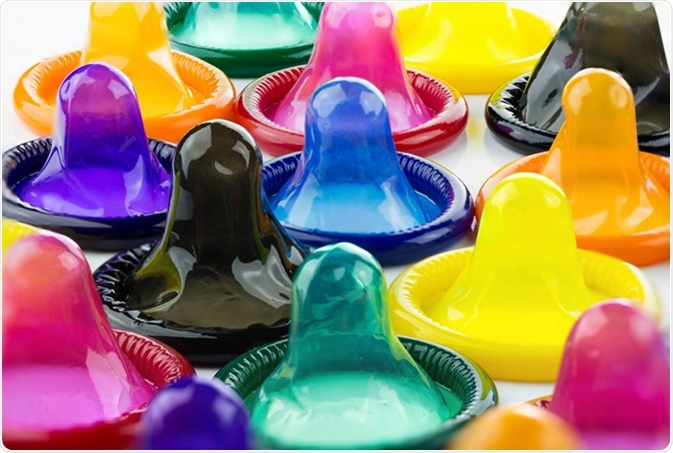Condoms are one of the most commonly used methods of contraception today. Contraceptive methods help to prevent pregnancies. This means using condoms is essentially a means of birth control. However, while birth control may be the primary purpose, a condom is also able to provide other benefits to the user. One such advantage is protection from sexually transmitted infections or STIs.

Image Credit: Urusaurus / Shutterstock
Using the Condom Correctly
While the condom is touted to have a 98% success rate, in real life the efficacy is much lower. This is because people do not use the condom properly, often damaging it during use and rendering it useless. Of course, it is also necessary to ensure that the condom being used is not past its expiry date.
How to Put On A Condom - Planned Parenthood
- Remove the condom from the sealed packet with care. Make sure that you do not allow teeth, jewellery or your nails to damage the condom as you remove it.
- The condom must be worn on an erect penis. Ensure that the air at the end of the condom is removed by gently pressing the teat after donning the condom.
- Roll down the condom carefully onto the erect penis so as not to tear it. Make sure you roll it all the way down to the base of the penis.
- If it is rolled on the wrong way, remove and throw it away as sperm may now be adherent to the condom. Do not have sexual intercourse with the condom the wrong way on, as it may slip and slide off during the act.
- After ejaculation, ensure the condom is held firmly at the base of the penis while withdrawing. Withdraw the condom-covered penis before the erection is lost.
- Dispose of the condom in an appropriate manner. Throw it in a dustbin rather than flush it down the toilet.
Advantages of Using a Condom
There are a number of advantages to using a condom as a contraception method, which is why it is probably one of the most popular methods currently in use.
- The condom may be purchased without a prescription. Most other contraception methods require the direct help of a health care provider along with a prescription. This makes condom use a great way to prevent many teen pregnancies.
- The condom is easy to use. Unlike methods where the health care provider is required to administer the contraception method, such as hormone injections or embedding an IUD, the condom can be used with no special skills.
- Condoms do not physically alter the fertility of the person using them. They are a single-time “use and throw” contraception method. There is no hindrance to the person being able to conceive the very next time they want to have sex.
- The product is freely available from a number of places., from grocery stores, to condom dispensing machines in public restrooms, and even online. It is possible to pick up a pack of condoms with great ease.
- Protection against STIs. By using a condom, which essentially creates a barrier preventing exchange of bodily fluids, many common sexually transmitted diseases such as HIV can be avoided. This is a major advantage for those not in a committed relationship. Those who regularly change partners are strongly advised to use the protection of a condom.
- Condom manufacturers have a variety of products available in terms of flavours and textures that are supposed to improve the sexual experience for the user. From prolonging the erection duration to enhancing the partner’s pleasure, they claim to offer multiple choices for the users.
- They have a high success rate as a contraceptive method when used properly. This means that condoms are inexpensive means of contraception that is easily available to the masses.
Disadvantages of Using a Condom
- Those with latex allergies may not be able to use regular condoms. An alternative would be to use polyurethane condoms, or condoms made out of lambskin. These are more expensive than the regular condoms.
- Reduced sensitivity during intercourse is a commonly voiced concern with couples who opt for condoms as a contraception method. Some couples claim that the pleasure during sexual intercourse is reduced due to the barrier posed by the latex condom.
- Condoms cannot be used with oil-based lubricants, only water-based ones. Oil-based lubricants can cause the latex material of the condoms to disintegrate and the condom may tear during actual intercourse.
- Excessive friction during intercourse may cause the condom to tear and may result in an unwanted pregnancy. This can be avoided by waiting a while before covering the penis with the condom during sexual intercourse. However, this need for interruption of the act can be a mood killer.
- After ejaculation, the male must pull out the of the vagina before the penis becomes flaccid to avoid the condom slipping and accidentally releasing the semen into the vagina. This may be difficult to do every time. Incorrect removal and disposal of the condom may cause unintended pregnancy.
References
- https://www.cdc.gov/reproductivehealth/contraception/
- http://www.pamf.org/teen/sex/birthcontrol/condom.html
- http://www.nhs.uk/Conditions/contraception-guide/Pages/male-condoms.aspx
- https://www.hhs.gov/opa/pregnancy-prevention/non-hormonal-methods/male-condom/index.html
Further Reading
Last Updated: Feb 26, 2019